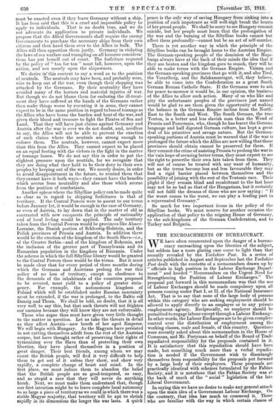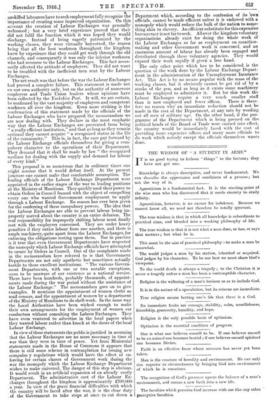THE ENCROACHMENTS OF BUREAUCRACY.
WE have often commented upon the danger of a bureau- cracy encroaching upon the liberties of the subject, but seldom has a more glaring case come to light than that recently revealed by the Yorkshire Post. In a series of articles published in August and September last the Yorkshire Post dealt with the contents of a memorandum drawn up by " officials in high position in the Labour Exchange Depart- ment " and headed " Memorandum on the Urgent Need for Strengthening the Position of Labour Exchanges." The proposal put forward in this memorandum was that -the use of Labour Exchanges should be made compulsory upon, all persons coming under Part I. or II. of the National Insurance Act. That is to say that none of the large body of persons within this category who are seeking employment should be allowed to apply directly to an employer or to any private employment -agency. Reciprocally, no employer should be permitted to engage labour except through a Labour Exchange. In other words, the Labour Exchanges are to be given coreplete control over the distribution of employment among the working classes, male and female, of this country. Questions were recently asked about this memorandum in the House of Commons, and Mr. Pretyman on behalf of the Board of Trade repudiated responsibility for the propbsals contained in it. It is satisfactory that this repudiation should have been made, but something much more than a Verbal repudia- tion is needed if the Government wish to disentangle themselves from resioonsibility for the proposals put forward by a large body of their employees. These proposals are practically identical with schemes formulated by -the Fabian Society, and it is notorious • that the Fabian Society was at the back of Mud/ • of the " social " legislation. Of the late Liberal Goveminent.
In saying this we have no desire to make any general attack upon. the main idea of a Government Labour Exchange. On the, contrary, that idea. has much. to commend it. Those who are familiar with the way in which certain classes of • . unskilled labourers have to seek employment fully recognize the importance of creating some improved organization. On this account the creation of Labour Exchanges was generally welcomed ; but a very brief experience proved that they did not fulfil the function which it was hoped they would discharge. Instead of being eagerly patronized by the working classes, they were virtually boycotted, the reason being that all the best workmen throughout the kingdom knew by experience that they could get work through the old channels, and consequently it was only the inferior workmen who had recourse to the Labour Exchanges. This fact neces- sarily affected the attitude of employers. They did not want to be troubled with the inefficient men sent by the Labour Exchanges. The net result was that before the war the Labour Exchanges had proved a complete failure. This statement is made not on our own authority only, but on the authority of numerous employers and Trade Union leaders whose opinions have been collected by the Yorkshire Post. It will, we are certain, be confirmed by the vast majority of employers and competent workmen all over the kingdom. Even more striking is the confirmation .of this statement made by the officials of the Labour Exchanges who have prepared the memorandum we are now dealing with. They declare in the most emphatic way that the Labour Exchanges are prevented from being " a really efficient institution," and that as long as they remain optional they cannot acquire " a recognized status in the life of the community." This is, in fact, the case put forward by the Labour Exchange officials themselves for giving a com- pulsory character to the operations of their Department. They demand that it shall be made by law " the recognized medium for dealing with the supply and demand for labour of every kind."
This proposal is so monstrous that in ordinary times one might assume that it would defeat itself. At the present juncture one cannot make that comfortable assumption. The leading officials of the Labour Exchange Department were appointed in the earlier stages of the war to leading positions at the Ministry of Munitions. They quickly used their power to obtain Orders in Council framed with the object of compelling every one who wanted Government employment to apply -through a Labour Exchange. No reason has ever been given for the conferring of these compulsory powers. The idea that the Labour Exchanges are able to prevent labour being im- properly moved about the country is an entire delusion. The real responsibility for improperly shifting labour must finally rest with the employers concerned. They are under heavy penalties if they entice labour from one another, and there is ample machinery, quite apart from the Labour Exchanges, for enforcing the obligations resting upon them. Nor in practice is it true that even Government Departments have respected the monopoly which Labour Exchange officials have attempted to create by Orders in Council. One of the complaints made in the memorandum here referred to is that Government Departments are not only apathetic but sometimes actually hostile to these excellent institutions. " The various Govern- ment Departments, with one or two notable exceptions, seem to be unaware of our existence as a national service. There have been hundreds, probably thousands, of appoint- ments made during the war period without the assistance of the Labour Exchange." The memorandum goes on to give examples. It mentions the appointment of women clerks as mail censors, and the appointment of women by a department of the Ministry of Munitions to do shell-work. In the same way the Local Authorities have been wicked enough to make their own arrangements for the employment of women car conductors without consulting the Labour Exchanges. They have even ventured .to advertise in the local papers when • they wanted labour rather than knock at the doors of the local Labour Exchange.
In view of these statements the public is justified in assuming that the Labour Exchanges are no more necessary in time of war than they were in time of peace. Yet from Ministerial statements made in the House of Commons it appears that there is still some scheme in contemplation for issuing new - compulso y regulations which would have. the effect of en- forcing for certain classes of Government work during the war the monopoly which the Labour Exchange Department wishes to make universal. The danger of this step is obvious. It would result in an artificial expansion of an already costly Department. The administrative cost of the Labour Ex- changes throughout the kingdom is approximately £700,000 a year. In view of the grave financial difficulties with which ,the country will be faced after the war, it is the clear duty of the Government to take steps at once to cut down a Department which, according to the confession of its 'own officials, cannot be made efficient unless it is endowed with a monopoly which would reduce the bulk of the nation to some- thing akin to slavery. An efficient substitute for this expensive bureaucracy is not far to seek. All over the kingdom voluntary organizations already exist for doing the whole work of the Labour Exchanges so far as employment on munition- making and other Government work is concerned, and an enormous amount of labour has already been engaged and distributed through these voluntary agencies. They would expand their work rapidly if given a free hand.
The only other point which has to be considered is the question of the work done by the Labour Exchange Depart- ment in the administration of the Unemployment Insurance Act. This Act is by no means popular with the mass of the working classes, but it obviously cannot be got rid of by a stroke of the pen, and as long as it exists some machinery must be employed to administer it. But for this work the Labour Exchanges require a very much smaller staff than is now employed and fewer offices. There is there- fore no reason why an inneediatp reduction should not be made in the cost of the Department, at any rate by weeding out all men of military age. On the other hand, if the pro- gramme of the Department which is being pressed on the political heads of the Board of Trade were carried into effect, the country would be immediately faced with the cost of providing more expensive offices and many more officials to do work which nobody except the officials themselves wants done.



































 Previous page
Previous page